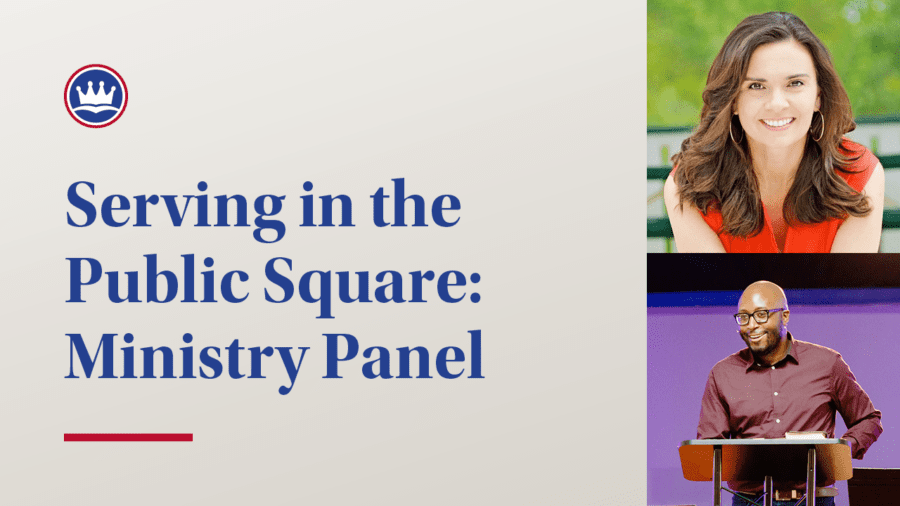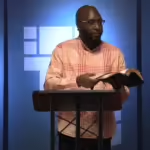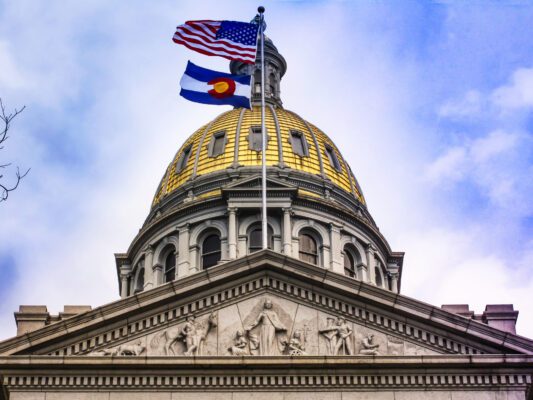On June 11, 2024, the ERLC had the privilege of hosting Dana Hall McCain and Jon Kelly for a panel about Christians, ministry, and hopeful political engagement at the Southern Baptist Convention annual meeting.
Jon, as a pastor, and Dana, as a staff member for a United States senator and a committed church member, give us helpful advice about the centrality of God’s Word, our identity in Christ, and our witness to our neighbors in a world of divisive politics.
Watch this video as they discuss questions like:
- How should Christians rightly think about political parties?
- How would you encourage a lay leader in the church to engage in a healthy way within their congregation when it comes to politics?
- Why even try to engage politically when pastoral ministry is exhausting without trying to navigate our contentious political culture?
Ministry Panel Transcript
Lindsay Nicolet: Pastors have encountered a lot of division in their churches stemming from the 2020 election and COVID-19. What advice would you give to pastors in this room that might help them build unity among their people?
Jon Kelly: Division has not been anything new, right? You read through the New Testament, you see Jews and Gentiles. So much of Paul’s writing is trying to get people to fellowship together who aren’t used to fellowshipping together. And it’s not like Jesus didn’t live in a time that was extremely divided.
We’ve had every reason for our church to be completely divided. Our church is about 450 people. Half the people are Democrat, half the people are Republican. You’ve got all different ethnicities and backgrounds. About 50% of the church is Black; the tther 50% is every ethnicity you could think of. And what I learned in 2016 when that election cycle was going on, was that so many people in our church had their identity more in touch with being a citizen of America than citizens of heaven. And so I just realized that I’m taking a blueprint from Paul, taking a blueprint from Jesus, and Jesus didn’t come preaching Rome. He didn’t come preaching Caesar. He didn’t come preaching Herod. He came preaching the Kingdom and that our citizenship is in heaven. We do need to be salt and light in the space that God has given us, but if you were going to be at Chicago West Bible Church, you knew that Christ was gonna be glorified. And he’s higher than any president or elected official. He’s our commander in chief and who we look to. And the Kingdom of God is greater than anything in this world and doesn’t fit nice and neat into any political party.
I have a friend that says, “John, if you’re gonna be a bridge builder, you gotta be prepared to be stepped on.” And so, Christians need to be prepared to be stepped on. And so for us, this is a great opportunity to disciple people and not have our identity in who we vote for or a political party. And there’s a lot of debates and conversations to be had. But for me as a pastor, it’s preaching the Kingdom of God and Christ as the Exalted One who is King over all.
LN: How should Christians rightly think about political parties? How can we see them as institutions that we have the opportunity to shape and where we are able to have constructive conversations?
Dana Hall McCain: I think one of the things that I would want to impress upon our friends here today is that our political parties are institutions that we should be shaping and leading, not that we should be shaped by and led by. And so we, as followers of Jesus Christ, it’s wholly appropriate for us to get involved as citizens and as concerned citizens who love our neighbors and want public policy that is good for our neighbors and try to influence both the party and the candidates that may be put forth.
But it’s very tricky because you have to understand that any political party, even the one that you think most aligns with a biblical worldview or your understanding of a Christian worldview, is still also heavily influenced by the world. And so you can never lose sight of that. You’ve got to go into your engagement with any organization like that, eyes wide open, and understanding that you’re on the mission field there just as much as you’re on the mission field anywhere that you engage as a follower of Christ.
JK: I just think, missionally, it’d be foolish of us to think that it’s not wise to have Christians as salt and light on Capitol Hill. You have to be salt and light where you are. We’ve had individuals in our church who serve in the Democratic Party. We have people in our church who serve in the Republican Party, and they’re in the same church. And my heart for both would be—what we try to do at least—we don’t tell you who to vote for, but we teach you how to think biblically. And you should be able to think biblically and let the Word of God guide everything that we do, everything we say, not your feelings, not your emotions, not what you’re seeing in culture. We need to exegete the culture and let the Word of God guide that. And I think we do need men and women who are in political parties guiding that way. But I don’t think you could do that in any party without being stepped on.
LN: I’m sure we have pastors who are wrestling with what their role in politics is in their preaching and in their everyday ministry. So what encouragement or advice would you give them?
JK: Preach the Word. I didn’t come to faith in Christ through a sermon. I came to faith in Christ in the prison cell. The guard gave me a Bible, and God’s Word was enough to save my soul. And God’s Word doesn’t need you to put sauce on it—all that extra stuff, your illustrations and all that. The people need the Word of God, and they need it coming from a humble heart that’s broken. Don’t cherry pick; just preach the Word. If the Word doesn’t address every issue specifically, it at least gives you the framework in how to think biblically about whatever issue you’re approaching. I think more that any time right now in which people are questioning truth, questioning what’s real, God’s Word never changes. The grass withers, the flower fades, but the word of God will endure forever. So I would just say, faithful men and women who are communicating from children’s ministry with children all the way up to pastors preaching in the pulpit, bring the Word of God.
DH: While I’m not a pastor and I’m hesitant to offer advice to pastors, I am a person who is blessed to sit under the leadership of a pastor that I think gets this really, really right. And he does it by doing a lot of the things that John just mentioned—preaching the Word expositorally, preaching faithfully day in, day out, and letting the Word do the work.
JK: I do want to add that we can’t run and cower from legitimate questions because we don’t want to face them. If you are actually in the streets talking to lost people, they have questions. And we’re thinking missionally, trying to help them think about how to flesh things out. We have to give a defense for the hope that we believe, Peter says. And so I think we need more than anything, we do need to guide folks on how to think biblically—not to win an argument, but that they might be reconciled to God. That’s the end point. And so, I don’t think you can pastor and not engage the political sphere because these are legitimate questions that people have.
LN: Dana, how would you encourage a lay leader in the church to engage in a healthy way within their congregation when it comes to politics?
DH: I think in everything that we do as ambassadors for Christ in the world, we have to be led by love. And I think the thing that trips us up right now is that so many of us and so many of our friends even in the church, are marinating every day in a media culture that thrives off of outrage. It thrives off of conflict because it is entertainment designed to keep you watching, keep you clicking. And they figured out that they can accomplish that by keeping you mad.
And so we walk away carrying this poison many times and having an attitude and a hardness of heart toward people who yes, have ideological differences from us that need to be corrected and need to be shown to be flawed through teaching and sharing of the Word, but we’ve gotta start from a posture of love toward those who are lost and those who do not understand how God has called us to live and how we might thrive and live full and and wonderful lives that the Lord wouldn’t have ordained for us.
JH: People hear love and they just think of this mushy thing. Scripture says in Corinthians that love doesn’t rejoice in evil, it rejoices in the truth. So loving your neighbor doesn’t mean you compromise your convictions, but the tone in which we communicate to one another kills our witness more than anything we’re talking about. I would just recommend that we operate more like surgeons and not butchers. Surgeons and butchers both use sharp objects to cut. Butchers are cutting with no regard for life. Surgeons cut only what they need to because they’re trying to preserve your life. And we just have too many Christians who are speaking right theology, but with the heart of a butcher and not the heart of a surgeon.
And when you’re a non-believer, seeing Christians talking and berating and belittling and mocking each other sarcastically like people do in high school stuff that you would tell your kids not to do, people walk away and say, “I don’t want none of that.” And it kills our witness.
Christians have disagreed for centuries, but if we have to show the world that we have a way of dialoguing in a way that’s not toxic and tearing down and belittling one another, I’ve never seen someone come to faith in Christ through being mocked, belittled, and berated by the person that they’re talking to. I’ve found a lot of people will receive hard truth from you if they know that your heart for them is sincere and that you want God’s best for them.
LN: Pastoral ministry is exhausting without trying to navigate our contentious political culture. So why even try to engage politically? Why not just avoid it altogether and check out?
JK: I think all political issues are a biblical issue because God’s Word speaks to everything. If you could see people in the imago Dei as souls created in the image of God who are lost, I think that needs to be the starting point. The starting point is not trying to win an argument. The starting point is you being reconciled to God and me not being a stumbling block and pointing you to Christ.
I would just give a practical tip for for pastors who want unity in the church: your church will only be as unified as your dinner table and couch. And if everyone that sits on your couch thinks like you, votes like you, talks like you, you just won’t see that in your church. And so I would challenge you: who’s at your dinner table, and who’s on your couch? Your neighbors, people down the street, people at the gym, families who go to your kids’ school? Be careful because we often reflect those things. And so as we think about politics, I think those things come second as we’re guided by relationships and doing life together and just letting the gospel flow through us.













